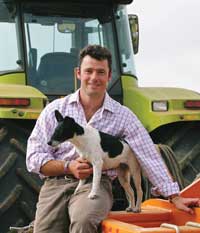Ian Pigott: Why I disagree with Prince Charles over the word ‘industry’

HRH The Prince of Wales made a personal and heartfelt address to the 1,200 guests at the Farmers Weekly Awards recently. And although he was unable to be with us in person, I felt honoured and privileged that Prince Charles cares enough about our industry (more of this in a minute) to take the time to prepare and deliver a speech to us, albeit via video.
The Prince has been, and still is, a great supporter of farming. Locally, through his home farm at Highrove, on a more macro level with Duchy Originals, and nationally endorsing initiatives such as Open Farm Sunday and the Year of Food and Farming. Farming could not wish for a stronger defender and champion.
But listening to his address last week, I could not help but think that as much as I would like to support his views, some are utopian and unrealistic.
Prince Charles is concerned that agriculture is “being encouraged towards ever larger farms”. He alluded to his disdain for the words “farm unit” and “industry”, saying that they are the language of the factory.
Farming is not being “encouraged” towards larger units, market forces and economies of scale are exacting the pressure to expand.
In the arable sector it is true that expansion is rife, but farms are not necessarily getting larger. In many instances, smaller farms are contracting out their field work, freeing up time to focus on environmental stewardship and diversification to complement growing crops.
The irony is that often the drive to take on extra land is in a quest to preserve the family farm that Prince Charles fears to be in so much jeopardy. Family farms need to expand to create a business large enough to viably sustain another generation on the farm.
His Royal Highness congratulated Farmers Weekly on its theme for the evening, “Together Everyone Achieves More”. He went on to say that “through co-operation and increasing professionalism farmers will be best able to adapt sharing knowledge, skills and research”.
In a nutshell, this is exactly why farms need to become larger to take advantage of the benefits of co-operation or collaboration.
No, farming is not an industrial production line per se – but it is an industry. It is a highly advanced, efficient and mechanised sector of British business that maximises the yield of its productive areas while promoting and enhancing biodiversity and habitats. Increasing scale does not compromise effective management of the environment.
He indicated that a move to larger farming enterprises would undo all the good work UK farmers have done to reconnect with their consumer. I am passionate about reconnection and, through my experience with LEAF, have learnt that consumers who visit Open Farm Sunday are unified in their admiration for the way that British farming has advanced and embraced technology. Technology that is too expensive to be justified on a small, family farm. Our visitors are reassured when they find out that their food is not produced by a real-life caricature of Eddy Grundy.
I agree with Prince Charles that agriculture is exactly that – it is about the land and the culture that those who work on it create. To preserve those things and continue to produce the high-quality food that we are so proud of, farming needs to be financially viable. Increasing efficiency and scale are inevitable outcomes of this quest.
WORDS FOR FWi box: Do you think farming should be described as an “industry”? Is this what it is, or is it a counterproductive term? Have your say by writing to the address on p29, emailing fwfarmlife@rbi.co.uk or posting on our forums at www.fwi.co.uk/industry
